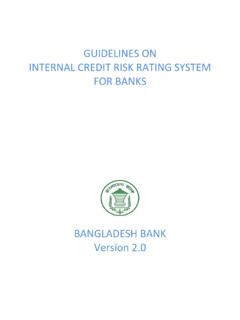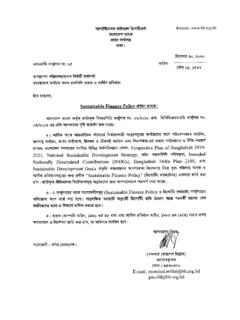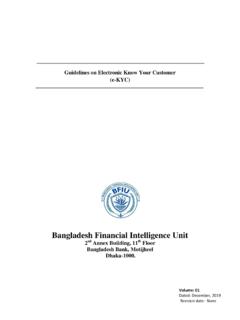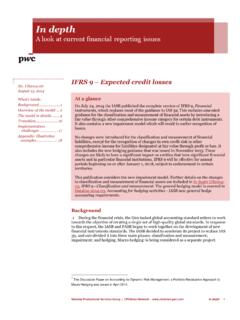Transcription of Website: www.bb.org.bd Banking Regulation & Policy ...
1 Page 1 of 10 Website: Banking Regulation & Policy Department Bangladesh Bank Head Office Dhaka September 23, 2012 BRPD Circular No. 14 Date: ------------------------------ Ashwin 8, 1419 Chief Executives All Scheduled Banks in Bangladesh Dear Sir, Master Circular: loan classification and Provisioning Please refer to BRPD Circular dated June 14, 2012 and attached CL formats on the captioned subject. Considering difficulties reported by banks and the business community, certain instructions of the circular have been reviewed; revised circular with the modifications is issued hereunder: Bangladesh Bank has, over the last several years, positioned the banks on a path towards higher regulatory capital ratios and a more precise calculation of each individual bank s need for capital, through a gradual implementation of internationally recognized capital standards.
2 The enforcement of a stricter regulatory capital regime also requires measures to improve the accuracy of financial data which are used internally, stated in the audited financial statements and reported to Bangladesh Bank as per rules. For both the bank s managerial and Bangladesh Bank s supervisory purposes, as well as for accurate valuation of a bank s capital in all of its financial reports is necessary. An accurate valuation of capital relies, in turn, on an accurate valuation of assets. loan -loss provisioning the recognition that some or all of the required payments on a loan may never be made is the single most important aspect of asset valuation to bankers and bank supervisors. It is important because loans typically make up 50% or more of the total assets of the bank. Basel II and Basel III devote a great deal of attention to the distinction between expected losses and unexpected losses on the bank s loan portfolio.
3 The purpose of provisioning is to take into account expected losses. Expected losses can be assigned to loans based on a loan classification system, which has been utilized in Bangladesh for many years and is being updated with this circular. Page 2 of 10 Bangladesh Bank also wishes to stress that it is the responsibility of bank management to adopt and implement proper accounting and reporting, and that correct classification and provisioning is a part of that responsibility. loan classification and provisioning must be a key component of a regular internal loan review process that looks at the current likelihood that the borrower will repay. The value of the formed allowance that results from the provisioning process should reflect all expected losses resulting from credit exposures. Bangladesh Bank has established requirements for general loan loss provisions, in certain percentages, for certain categories of loans that are unclassified or in the Special Mention Account.
4 As the name suggests, general provisions are assigned to take into account the expected losses on pools of loans that are thought to have similar characteristics. The characteristics of each individual loan are not analyzed. Put differently, it is not known or even assumed which loan or loans in the pool are going to result in loan losses; it is simply taken as given that in such large pools, even those currently unclassified, there will undoubtedly be individual loans that in the future will not be repaid. Ideally, the percentages of provision that are applied to each pool are determined based on historical loss experience of similar loan pools. Banks are encouraged to calculate these historical loss experiences on the loan pools for which Bangladesh Bank has indicated general provision percentages, and use these data if they result in higher provisions than are required in this circular.
5 Because general provisions are not formed based on expectations of loss on any individual loan , they are allowed to be included in the calculation of Tier 2 capital, subject to some restrictions. In contrast, specific provisions (established on loans that are classified as Sub-standard, Doubtful or Bad/Loss) are set up on a loan -by- loan basis after careful analysis of each individual loan s probability of repayment. For loans placed into any of these classification categories, weaknesses have been identified that cast doubt on the borrower s ability or intent to make all contractual payments in a timely manner. For this reason, specific provisions are not allowed to be included in the calculation of Tier 2 capital. 1. Categories of Loans and Advances : All loans and advances will be grouped into four (4) categories for the purpose of classification , namely- (a) Continuous loan (b) Demand loan (c) Fixed Term loan and (d) Short-term Agricultural & Micro- Credit.
6 A) Continuous loan : The loan accounts in which transactions may be made within certain limit and have an expiry date for full adjustment will be treated as Continuous loan . Examples are: Cash Credit, Overdraft, etc. b) Demand loan : The loans that become repayable on demand by the bank will be treated as Demand loan . If any contingent or any other liabilities are turned to forced loan ( without any prior approval as regular loan ) those too will be treated as Demand loan . Such as: Forced loan against Imported Merchandise, Payment against Document, Foreign Bill Purchased, and Inland Bill Purchased, etc. Page 3 of 10 c) Fixed Term loan : The loans, which are repayable within a specific time period under a specific repayment schedule, will be treated as Fixed Term loan . d) Short-term Agricultural & Micro-Credit: Short-term Agricultural Credit will include the short-term credits as listed under the Annual Credit Programme issued by the Agricultural Credit and Financial Inclusion Department (ACFID) of Bangladesh Bank.
7 Credits in the agricultural sector repayable within 12 (twelve) months will also be included herein. Short-term Micro-Credit will include any micro-credits not exceeding an amount determined by the ACFID of Bangladesh Bank from time to time and repayable within 12 (twelve) months, be those termed in any names such as Non-agricultural credit, Self-reliant Credit, Weaver's Credit or Bank's individual project credit. 2. Basis for loan classification : a) Objective Criteria: (1) Past Due/Over Due: (i) Any Continuous loan if not repaid/renewed within the fixed expiry date for repayment or after the demand by the bank will be treated as past due/overdue from the following day of the expiry date. (ii) Any Demand loan if not repaid within the fixed expiry date for repayment or after the demand by the bank will be treated as past due/overdue from the following day of the expiry date.
8 (iii) In case of any installment(s) or part of installment(s) of a Fixed Term loan is not repaid within the fixed expiry date, the amount of unpaid installment(s) will be treated as past due/overdue from the following day of the expiry date. (iv) The Short-term Agricultural and Micro-Credit if not repaid within the fixed expiry date for repayment will be considered past due/overdue after six months of the expiry date. (2) All unclassified loans other than Special Mention Account (SMA) will be treated as Standard. (3) A Continuous loan , Demand loan or a Term loan which will remain overdue for a period of 02 (two) months or more, will be put into the "Special Mention Account(SMA)". This will help banks to look at accounts with potential problems in a focused manner and it will capture early warning signals for accounts showing first sign of weakness.
9 Loans in the "Special Mention Account (SMA)" will have to be reported to the Credit Information Bureau (CIB) of Bangladesh Bank. (4) Loans except Short-term Agricultural & Micro-Credit in the "Special Mention Account" and Sub-Standard will not be treated as defaulted loan for the purpose of section 27 KaKa(3) [read with section 5(GaGa)] of the Banking Companies Act, 1991. Page 4 of 10 (5) Any continuous loan will be classified as: i. Sub-standard if it is past due/overdue for 03 (three) months or beyond but less than 06 (six) months. ii. Doubtful if it is past due/overdue for 06 (six) months or beyond but less than 09 (nine) months iii. Bad/Loss if it is past due/overdue for 09 (nine) months or beyond. (6) Any Demand loan will be classified as: i. Sub-standard if it remains past due/overdue for 03 (three) months or beyond but not over 06 (six) months from the date of expiry or claim by the bank or from the date of creation of forced loan .
10 Ii. Doubtful if it remains past due/overdue for 06 (six) months or beyond but not over 09 (nine) months from the date of expiry or claim by the bank or from the date of creation of forced loan . iii. Bad/Loss if it remains past due/overdue for 09 (nine) months or beyond from the date of expiry or claim by the bank or from the date of creation of forced loan . (7) In case of any installment(s) or part of installment(s) of a Fixed Term loan is not repaid within the due date, the amount of unpaid installment(s) will be termed as past due or overdue installment . In case of Fixed Term Loans: - i. If the amount of past due installment is equal to or more than the amount of installment(s) due within 03 (three) months, the entire loan will be classified as ''Sub-standard''. ii. If the amount of past due installment is equal to or more than the amount of installment(s) due within 06 (six) months, the entire loan will be classified as ''Doubtful".









